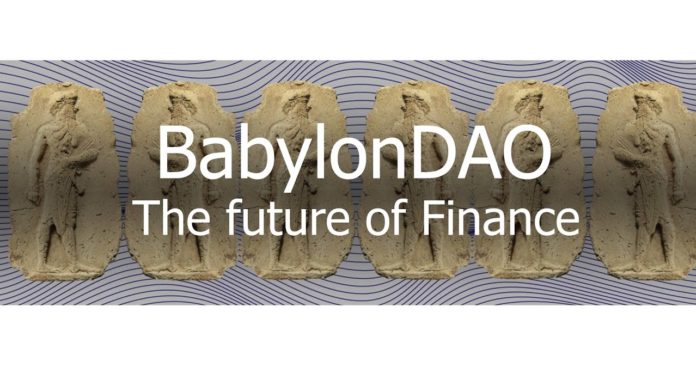BabylonDao is a new DeFi 2.0 protocol launching on Solana that will challenge the top 3 Ohm and its forks like Kilma and Time. Here’s how BabylonDao is different from other Ohm forks and why it should be taken seriously compared to other Ohm forks.
BabylonDao has taken up quite a bit of time on their launch, and it’s for a good reason.
These are the 3 points on why BabylonDAO is unique, and we will go through them in detail
- Super strong community and solid roadmap
- Babylonswap: building their DEX (the goal is to have all trading pairs)
- Babylon is not looking at being an $OHM fork. It’s looking at being the reserve currency of the whole internet.
BabylonDAO is building its DEX (the goal is to have all trading pairs) called Babylonswap. Babylon is not looking at being an $OHM fork. It’s looking at being the reserve currency of the whole internet.
BabylonDAO is another rebase token.
Why is there a need for BabylonDao?
- Bitcoin is too volatile to use as a payment.
- Dollar-pegged-stablecoins suffers from inflation
- By incorporating a DEX, the team has added a potentially massive stream of revenue straight into the treasury.
Here is an article that explains about Defi 2.0 game theory: https://medium.com/@MutMinty/how-to-bring-prosperity-to-babylon-and-its-citizens-4dd6d1358811
On Babylon you can do 3 things:
- Stake Hourglass with flowing sand,Hourglass with flowing sand
- Bond Hourglass with flowing sand,Hourglass with flowing sand
- Sell
Staking and minting are considered beneficial to the protocol, while selling is deemed to be detrimental.
The best scenario is that we stake: APY goes up
The worst scenario is when we sell: APY goes down

Let’s start with the details:
1. Community and roadmap:
Babylon DAO is launching on Sunday 28th November 2021, and without any marketing, they have already 38,000 Discord members and 16K followers on Twitter.
A part of the reason for the high activity in the Discord channel is the token-launch $BBY. Compared to other Defi 2.0 launches, Babylon wants to have a fair launch where the most active members in the Discord channel are rewarded.
$BBY tries only to whitelist people who will put in effort and time in the project.
The $BBY token will have an initial supply of 38,220 $BBY, and the tokens will be allocated in this manner:
-Initial Prayers: 28,200 (73.8%)
-Team: 7,000 (18.3%)
-Advisors: 2,000 (5.2%)
-Further development of Babylon projects and grants: 1,020 (2.7%)
Why are they launching in this way?
Because there’s too much capital in abundance.
-If you whitelist based on who was first, they will inevitably dump when the price goes 100X.
-If you whitelist VCs, they will inevitably dump, too (we’ve seen many cases).
But if you only whitelist people who’ve put in the effort, then you’ll find the right diamond hands who believe in the product, the vision, and the team. Additionally, with so many forks around, we’ve seen liquidity move from 1 project to another super fast…
In such an environment, how do you build a strong community?
-By having shared rituals
-Having a sense of purpose within the community.
Babylonswap
Solid decentralized exchanges are one of the most significant innovations in crypto IMO. On a DEX, any new crypto project can launch its token, provide some startup liquidity. With their token, and then have the rest of the liquidity provided by the community.
The drawback: As quickly as your community can add funds, they can take it away.
BabylonSwap is a decentralized exchange using DEX-owned liquidity.
The era of liquidity miners seeking yield across the metaverse and endangering those who want to use protocols for their futures have ended. Imagine the amount of value capture we’ll see with the combined power of an OHM-like community of stakers alongside a DEX fueling the astronomical rise of DEFI on Solana.
Uniswap alone has generated more than 1 billion dollars in revenue. Imagine if that was going straight into the $BBY treasury.
$BBY – The reserve currency of the Internet:
Okay, so will $BBY beat $OHM/$TIME?
We’ve seen too many launches of DeFi 2.0-products lately, and the question is:
“Who will win?”
The answer: The winner will be the one with the most liquidity in the market.
$OHM has some obvious drawbacks, and, e.g. the liquidity in between the rebases.
$BBY solves this by punishing people who unstakes.
If you unstake, you are not allowed to stake again immediately.
You can only stake again at random (you have to wait between 1 and 60 hours from your unstacking). This improves liquidity and makes the protocol more GameFI alike.
From what I’ve seen from the team on Discord, this team wants to innovate DeFi 2.0 by changing the rules and making improvements to the protocol that it’s the best for the community.
Another aspect, there are several forks of $OHM now. Why another one?
$BBY is launching on Solana, which has high speed and very low fees. Yes, $IN already exists, but this is just a 100% copy-pasta of $OHM, no originality, and that’s why we haven’t got in there.



